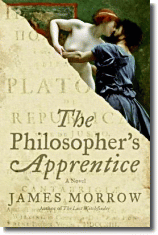
He applied the Page 69 Test to his new novel, The Philosopher’s Apprentice, and reported the following:
When I first tried my hand at the narrative arts, drama was the form that seemed to best accommodate my passion for satire and philosophy. By the time I’d graduated from college, I had four three-act seriocomedies under my belt.Read an excerpt from The Philosopher's Apprentice, and learn more about the author and his work at James Morrow's website and his blog.
Given my status as a playwright manqué, I was not surprised to open The Philosopher’s Apprentice to page 69 and encounter an exchange of dialogue. I’ve reprinted the entire text below, carrying one speech over from page 68 and appropriating the line-wrap from page 70. It’s pure theater. Several paragraphs earlier, the curtain rose on a living room in the Florida Keys. Our first-person narrator is Mason Ambrose, a failed philosophy Ph.D. student who’s been hired to implant a conscience in an adolescent named Londa, an alleged amnesia victim whose moral compass evidently vanished along with her memories.
The scene finds Mason sharing his recent adventures with Henry Cushing and Brock Hawes, likewise employed as ethics teachers, their feral pupil being a preschooler named Donya. While I would never submit page 69 as the sine qua non of my book — which ultimately becomes an epic filled with utopian cities, angry adult fetuses, and hijacked reincarnations of R.M.S.Titanic — the snippet does capture Mason’s essential situation. Do these speeches sound a bit like detective-thriller exposition? Nolo contendere — though the novel’s central mystery is philosophical: whence cometh morality, and what does it mean to forge another person’s soul? Pygmalion meets Lolita on the Island of Dr. Moreau.
Page 69 of The Philosopher’s Apprentice:
“In other words, Londa woke up without a conscience,” Brock said. “Donya has the same deficit.”
“So I hear,” I said. “No rectitude. What a strange coincidence.”
“I don’t think it’s a coincidence at all,” Henry said. “It appears that Edwina has been playing games with our heads, and her children’s heads, too, and maybe her own head as well.”
“Did Donya also have a diving accident?” I asked.
“Supposedly she fell off her bicycle,” Brock said.
“Londa has inherited her maternal grandfather’s gift for speed reading,” I informed my new friends. “And Donya?”
Henry hummed in corroboration. “Yesterday she got through Heidiin fifteen minutes. This morning she devoured The Secret Garden in ten.”
“Did Edwina ever mention a second daughter?” I asked.
Henry and Brock shook their heads in tandem.
“When I had tea with Donya, she told me she’s an only child,” I said. “Londa believes the same about herself. Evidently Edwina makes a point of it.”
“Curiouser and curiouser,” Henry said.
For the next half-hour, we attempted to construct a coherent narrative that would account for the bizarre domestic arrangements on Isla de Sangre, but far from dissolving the mystery we only deepened it. Our employer’s nomadism had us especially confused. Just as I’d assumed that Edwina resided exclusively with Londa at the moldering estate called Faustino, so did Henry and Brock believe she was permanently ensconced with Donya at Casa de los Huesos.
“Apparently she spends much of her time on the move, a peculiar lifestyle for a person allegedly in poor health.” Henry flipped back the top of the carousel and removed the mini-CD. “Proposition, Mason. While the cat’s away in Chicago, why don’t we mice spend Saturday afternoon exploring the island?” Receiving my nod, he smiled approvingly, then inserted a disc labeled “Being for the Benefit of Mr. Kite” into the carousel. “I can’t speak for you or Brock, but I won’t rest until I’ve figured out precisely how many daughters Edwina has, and who their fathers are, and why the hell the children aren’t supposed to know about each other.”
Visit the complete list of books in the Page 69 Test Series.
--Marshal Zeringue





